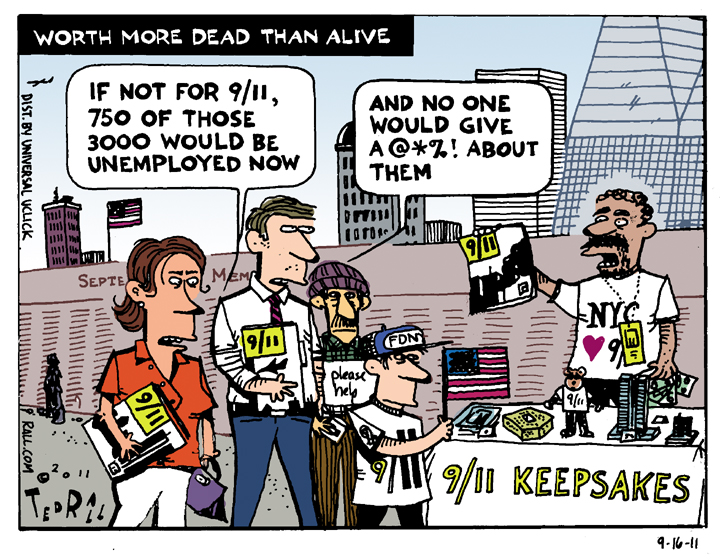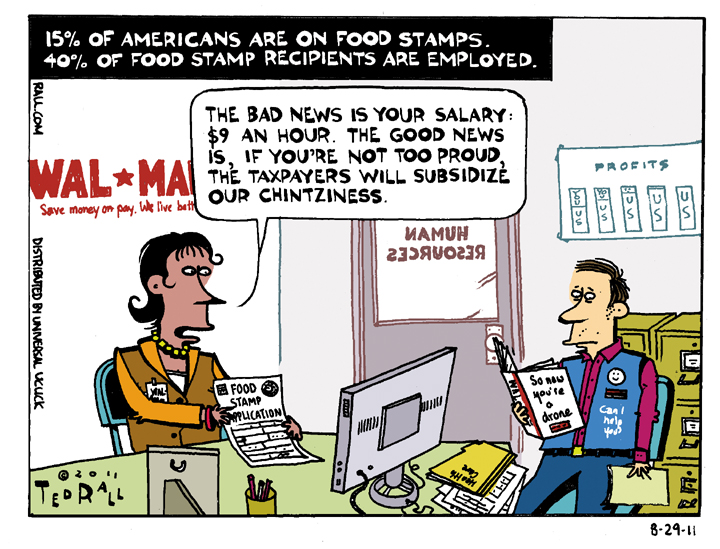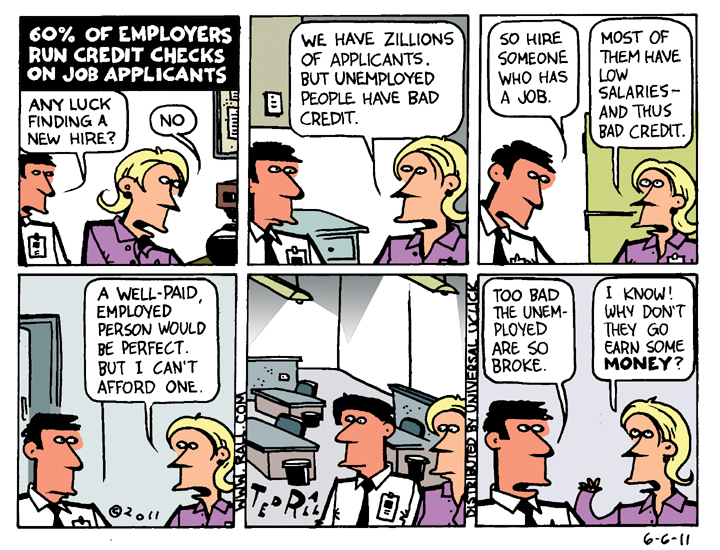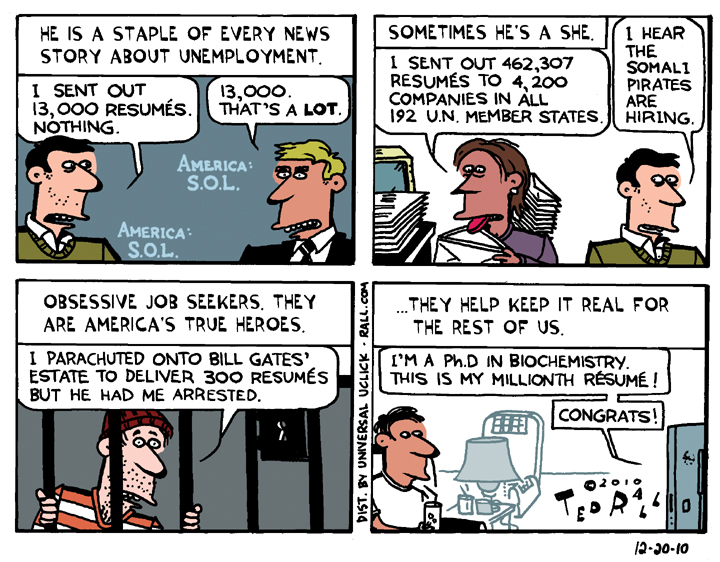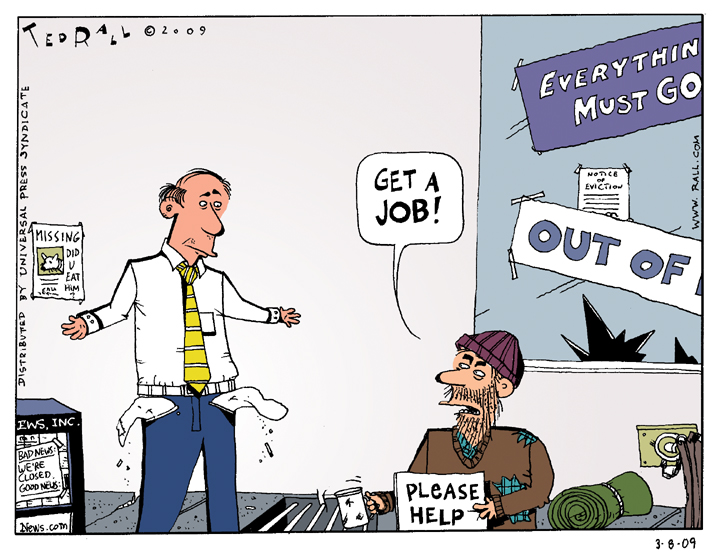Obama babbles his way to irrelevance.
SYNDICATED COLUMN: Ah, To Be Young And In Hate
America’s New Radicals Attack a System That Ignores Them
“Enraged young people,” The New York Times worries aloud, are kicking off the dust of phony democracy, in which “the job of a citizen was limited to occasional trips to the polling places to vote” while decision-making remains in the claws of a rarified elite of overpaid corporate executives and their corrupt pet politicians.
“From South Asia to the heartland of Europe and now even to Wall Street,” the paper continues, “these protesters share something else: wariness, even contempt, toward traditional politicians and the democratic political process they preside over. They are taking to the streets, in part, because they have little faith in the ballot box.”
The rage of the young is real. It is justified. It is just beginning to play out.
The political class thinks it can ignore the people it purports to represent. They’re right–but not forever. A reckoning is at hand. Forty years of elections without politics will cost them.
Americans’ pent-up demand for a forum to express their disgust is so vast that they are embracing slapdash movements like Occupy Wall Street, which reverses the traditional tactic of organizing for a demonstration. People are protesting first, then organizing, then coming up with demands. They have no other choice. With no organized Left in the U.S., disaffected people are being forced to build resistance from the ground up.
Who can blame young adults for rejecting the system? The political issue people care most about–jobs and the economy–prompts no real action from the political elite. Even their lip service is half-assed. Liberals know “green jobs” can’t replace 14 million lost jobs; conservatives aren’t stupid enough to think tax cuts for the rich will help them pay this month’s bills.
The politicians’ only real action is counterproductive; austerity and bank bailouts that hurt the economy. Is the government evil or incompetent? Does it matter?
Here in the United States, no one should be surprised that young adults are among the nation’s angriest and most alienated citizens. No other group has been as systematically ignored by the mainstream political class as the young. What’s shocking is that it took so long for them to take to the streets.
Every other age groups get government benefits. The elderly get a prescription drug plan. Even Republicans who want to slash Medicaid and Medicare take pains to promise seniors that their benefits will be grandfathered in. Kids get taken care of too. They get free public education. ObamaCare’s first step was to facilitate coverage for children under 18.
Young adults get debt.
The troubles of young adults get no play in Washington. Pundits don’t bother to debate issues that concerns people in their 20s and 30s. Recent college graduates, staggering under soaring student loan debt, are getting crushed by 80 percent unemployment–and no one even pretends to care. Young Americans tell pollsters that their top concerns are divorce, which leaves kids impoverished, and global warming. Like jobs, these issues aren’t on anyone’s agenda.
This pot has been boiling for decades.
In 1996 I published “Revenge of the Latchkey Kids,” a manifesto decrying the political system’s neglect and exploitation of Generation X, my age cohort, which followed the Baby Boomers.
We were in our 20s and low 30s at the time.
Un- and underemployment, the insanity of a job market that requires kids to take out mortgage-sized loans to attend college just to be considered for a low-paid entry-level gig in a cube farm, the financial and emotional toll of disintegrating families, and our fear that the natural world was being destroyed left many of my peers feeling resentful and left out–like arriving at a party after the last beer was gone.
Today the oldest Gen Xers are turning 50. Life will always be harder for us than it was for the Boomers. If I had to write “Latchkey Kids” for today’s recent college grads, it would be bleaker still. Today’s kids–demographers call them Gen Y–have it significantly worse than we did.
Like us, today’s young adults get no play from the politicians.
The debts of today’s Gen Yers are bigger ($26,000 in average student loans, up from $10,000 in 1985). Their incomes are smaller. Their sense of betrayal, having gone all in for Obama, is deeper.
Young adults turned out big for Obama in 2008, but he didn’t deliver for them. They noticed: The One’s approval rating has plunged from 75 percent among voters ages 18-29 when he took office in January 2009 to 45 percent in September.
Politicians like Obama ignore young adults, especially those with college degrees, at their–and the system’s–peril. Now, however, more is at stake than Obama and the Democrats’ 2012 election prospects. The entire economic, social and political order faces collapse; young people may choose revolution rather than accept a life of poverty in a state dedicated only to feeding the bank accounts of the superrich.
As Crane Brinton pointed out in his seminal book “The Anatomy of Revolution,” an important predictor of revolution is downward mobility among strivers, young adults whose education and ambition would traditionally have led to a brighter future.
In February Martin Wolf theorized in The Financial Times that the Arab Spring rebellions in Egypt and Tunisia owed their success to demographics; those countries have more young people than old ones. On the other hand “middle-aged and elderly rig political and economic life for their benefit in the U.K. [he could also have said the U.S.]: hence the way in which policies on housing or education finance are weighted against the young.”
Right here and right now, though, the young and the old are on the same side. Though the young are getting screwed the hardest, almost everyone else is getting screwed too. And with 80 percent unemployment, the young have a lot of free time to rise up.
(Ted Rall is the author of “The Anti-American Manifesto.” His website is tedrall.com.)
COPYRIGHT 2011 TED RALL
SYNDICATED COLUMN: Down and Out at 1600 Pennsylvania Avenue
What I Would Do If I Were Obama
Jobs, jobs, jobs. Throughout the presidency of Barack Obama, Americans have been preoccupied with jobs. Unemployed people need work. The underemployed need more work. The employed want salaries that go up instead of down.
The rich are worried too. The Depression of 2008-? is killing their stock portfolios.
Most presidents struggle to find the pulse of the people. Trapped in the D.C. bubble, they try to find out what voters want. Obama was lucky. He didn’t have to do that. The U.S. was in the midst of an epic economic collapse in January 2009, and has been ever since. It’s the only issue that everyone, rich to middle to poor, cared about. It still is.
In this single-issue environment, any idiot could have been a successful president. All Obama had to do was express sympathy and understanding while announcing a bunch of jobs initiatives.
Not hard.
Weirdly, though, Obama has focused on everything else except jobs: healthcare, gays in the military, gays getting married, more war against Afghanistan, new war against Libya, secret wars against Somalia and Yemen, the dreary showdown over taxes, budget cuts and the federal debt ceiling.
According to the latest ABC News/Washington Post poll, Obama’s approval rating is down to 39 percent. The crappy economy—and Obama’s inaction—is the simple cause.
“What Happened to Obama?” Drew Westen asked in a much-passed-around New York Times op-ed. It used to be just me. Now everyone sane agrees that Obama’s presidency has failed.
This is my favorite part of Westen’s postmortem: “Those of us who were bewitched by his eloquence on the campaign trail chose to ignore some disquieting aspects of his biography: that he had accomplished very little before he ran for president, having never run a business or a state; that he had a singularly unremarkable career as a law professor, publishing nothing in 12 years at the University of Chicago other than an autobiography; and that, before joining the United States Senate, he had voted “present” (instead of “yea” or “nay”) 130 times, sometimes dodging difficult issues.”
Westen is nicer than I am. He left out the fact that Obama had an undistinguished career as a U.S. Senator.
Is Obama a secret pawn of evil plutocrats? Does he suffer a character flaw alluded to in Westen’s piece, that he doesn’t know who he is?
Maybe. But I don’t think so. I think eight years of George W. Bush caused Americans to make a mistake. Obama was calm, so they assumed he was wise.
Obama is calm. He’s calm that it’s hard to tell if he’s sentient. But that doesn’t make him smart. Based on his record before and after becoming president, there’s a better-than-even chance that he’s not very smart.
Let’s be logical. Let’s assume that appearances don’t lie—that Obama doesn’t lose a wink of sleep over the fact that he’s presiding over a disaster that makes 9/11 look like a joke.
Let us further stipulate, for the sake of argument, that Obama isn’t stupid. That he’s merely another cynical and/or corrupt politician. If nothing else, Mr. Cynical (But Intelligent) Dirtbag ought to care about getting reelected.
Right?
If I were in Obama’s shoes, and I had any brains, if I wanted to turn those lousy poll numbers around, I’d hold press conferences to talk about jobs every day. I’d talk about jobs until the media was sick of it. Then I’d do it some more.
I’d spend two or three nights every week couchsurfing with families who were suffering, cameras rolling as I pretended to care about their silly problems with mean bosses and evil health insurers.
Most importantly, I’d set up next year’s television attack ads. I wouldn’t let a single week go by without proposing some piece of legislation related to creating jobs, alleviating the problems of the jobless, and increasing wages.
I’d send Congress huge publics-works bills. I’d ask them to hire millions of unemployed people to work for federal agencies. I’d push for higher unemployment benefits, payments that don’t expire until you find a job. Tax breaks for companies that hire. Tax deductions for those that give raises. Penalties for outsourcing jobs. Keep the Bush tax cuts, but only for the poor and middle class.
Let the Republicans kill my ideas. All the better for my 2012 ad buy! “Republicans voted against new jobs for Americans 22 times. Against helping homeowners keep their houses 15 times. Republicans: They just don’t care about you.” You get the idea.
Of course, a president can accomplish a lot by executive order. Remember that story about how Apple had more ready cash than the U.S. Treasury? Since America obviously needs the money more than Steve Jobs, Obama could have nationalized it and given it to the states in order to bolster their unemployment compensation funds.
American voters are so defeated and disgusted that they no longer demand a president like FDR or LBJ who actually fights for them. They’ll settle for one who goes through the motions.
The question for Obama and his advisors is: Are they smart enough to pretend to care about the only issue that matters to voters?
(Ted Rall is the author of “The Anti-American Manifesto.” His website is tedrall.com.)
COPYRIGHT 2011 TED RALL
The Anti-American Manifesto
A revolutionary manifesto for an America heading toward economic and political collapse. While others mourn the damage to the postmodern American capitalist system created by the recent global economic collapse, I see an opportunity. As millions of people lose their jobs and their homes as the economy collapses, they and millions more are opening their minds to the possibility of creating a radically different form of government and economic infrastructure.
But there are dangers. As in Russia in 1991, criminals and right-wing extremists are best prepared to fill the power vacuum from a collapsing United States. The best way to stop them, I argue here, is not collapse—but revolution. Not by other people, but by us. Not in the future, but now. While it’s still possible.
The Anti-American Manifesto was widely discussed among progressives and leftists and remains a basis of discussion for people seeking to create the space to discuss politics outside of electoral irrelevance — a revolutionary movement.
I admire Rall. He is prolific writer of good sentences. He is a prolific drawer of bitterly ironic cartoons. He is a serious reporter. He is honest about his own failings and wandering ideology. And he has dusted off the r-word at exactly the right moment in American history. He wants a revolution. And I agree with him. A revolution is exactly what the United States needs. The amount of cultural/economic/political change needed to save the world in the brief time we have left is unimaginable without a revolution. You can argue that the ruling class is evil, you can argue that the ruling class is incompetent, you can argue that the ruling class is both. But it has never been more clear that the ruling class is impervious to reform through established channels and the rest of us can look forward to incalculable suffering unless we get rid of it. “Revolution doesn’t happen within the system,” Rall says. “Revolution is the act of destroying the system.” Yup. —TruthOut
You have to give points for audacity to begin a book advocating the overthrow of the U.S. government. In his new book The Anti-American Manifesto, political cartoonist and columnist Ted Rall does just that. Perhaps most dangerously, he makes revolution sound like the only reasonable thing to do. Like the child who proclaimed the emperor had no clothes, Rall’s book has the effect of rendering self-evident what is hardly ever mentioned in public, though we all privately know it to be true: this system is broken beyond repair. —Socialist Worker
Political Manifesto, 2010
Seven Stories Press Trade Paperback, 5″x7″, 286 pp., $15.95
To Order From Amazon: click here.
To Order A Personally Signed Copy directly from Ted:


